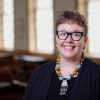This article is more than 5 years old.
As you might imagine, my Midwinter weekend in Dallas continued Saturday with more scholarly communication-related meetings. First up yesterday morning (and by first up, I mean at a lovely 10:30am start time!) was the ALCTS Scholarly Communication Interest Group, addressing “Identifiers, Citation & Linked Data as Part of the Scholarly Communication System.” Three panelists from California Digital Library, Biodiversity Heritage Library (not an actual library, but a consortium), and the Smithsonian Institutes Libraries addressed the reasons we need to care about linked open data, and the myriad challenges bad, closed data presents. Very interesting projects were highlighted, and as I was walking from the session to the EBSCO lunch, my head was buzzing with thoughts about all the data we produce at ZSR and related implications.
After a pleasant, if long, EBSCO lunch with lots of ZSR folks, I grabbed a couch in the Omni and took a break for a bit before hitting the exhibit floor. From the exhibits I walked to Timbuktu (aka, the far end of the convention center) for the SPARC/ACRL Forum. The Forum theme was “Getting the Rights Right,” and the five panelists represented a broad range of views, from librarians in the UK and US to a technologist using open data to Creative Commons to a large Holland-based publisher. Each speaker had varying and interesting perspectives on rights issues, but I felt that the overarching theme was a tad lost this time, as the speakers’ messages didn’t weave together in a clear manner. Apparently, the audience (which included Wanda on the far side of the room!) also felt as I, as there were very few questions put forward. Nonetheless, there was good information shared.
Sunday started bright and early with the ACRL Scholarly Communication Committee meeting, which is a marathon 4-hour meeting. Fortunately, we’re a fun group, and our meeting not only ran ahead of schedule, but was punctuated with lots of laughter. It was also an incredibly productive, encouraging meeting, with good news on a number of fronts: work that’s happening on the intersection of scholarly communication and information literacy (ZSR’s LIB 100 program is primed for this!!!); the future of the Road Show program I’m part of and the success of our expanded preconference test drive; updates from ARL, SPARC, and SCOAP3; and discussion around the future direction of the committee. You may have heard that the ACRL Board is looking to restructure and realign committees to better fit the new Plan for Excellence, and under the current proposal (to be voted on by the Board on Monday), the Scholarly Communication Committee will have a slightly revised charge and new name, the Research and Scholarly Environment Committee. This was my first meeting as a committee member, and I am excited to see where we go!
My Midwinter wrapped up Sunday afternoon with the ACRL Scholarly Communication Discussion Group, which featured two of the panelists from Saturday’s SPARC/ACRL Forum: Lisa Macklin and David Prosser. Both Lisa and David recapped what they shared at the Forum (GSU copyright case and UK copyright & Research Works Act, respectively), then opened the floor for questions. Fewer people attend this session, so the group was able to truly have a discussion, which touched on numerous topics: the GSU case; data management and ownership; the benefits and drawbacks of using CC licenses with noncommercial restrictions; and implementation strategies for OA policies. I heard two things at this session that concern me, though. First, the Copyright Clearance Center, which is not a plaintiff but is paying for the GSU copyright trial, is soliciting faculty to join focus groups, with the presumed ulterior motive of sussing out infringing activities. And second, Harvard faculty have received direct, targeted email from publishers spreading FUD about the various OA policies adopted by Harvard faculties (there’s more than one, oddly). Both of these moves are stealthy and known only through happenstance, and deeply concern me.
While my final official Midwinter session did not end on as positive a note as I might wish, this has been an insightful conference and I’m heading back to ZSR with lots of food for thought!

4 Comments on ‘A Midwinter Weekend in Dallas’
FUD: fear, uncertainty and doubt? Not Fedora Users and Developers? (the other acronym that was pulled up in a Google search) 🙂 Sounds like you’ve had a worthwhile conference!
Thanks for this update on scholarly communication and copyright-thee is always some issue lurking that threatens freedom of information. I appreciate this information.
Yes, Susan, fear, uncertainty and doubt! I use took my acronyms, don’t I?! 🙂
FUD, I’ll remember that! Thanks for the interesting, if unclear (not your fault) update on rights issues. It continues to evolve.